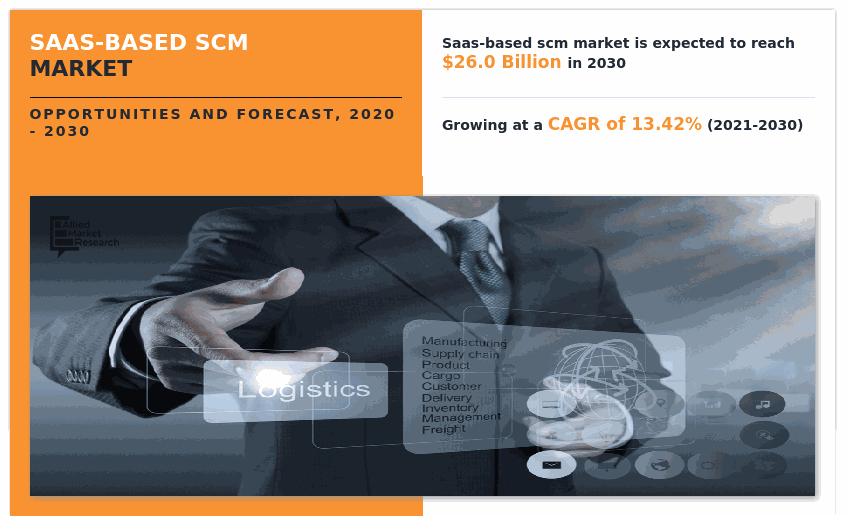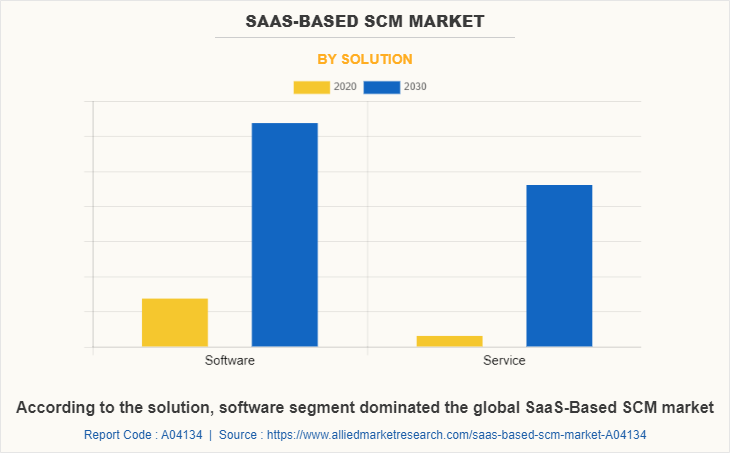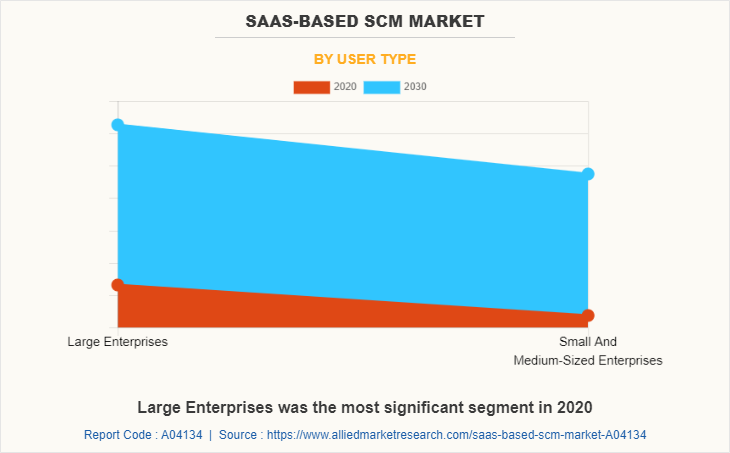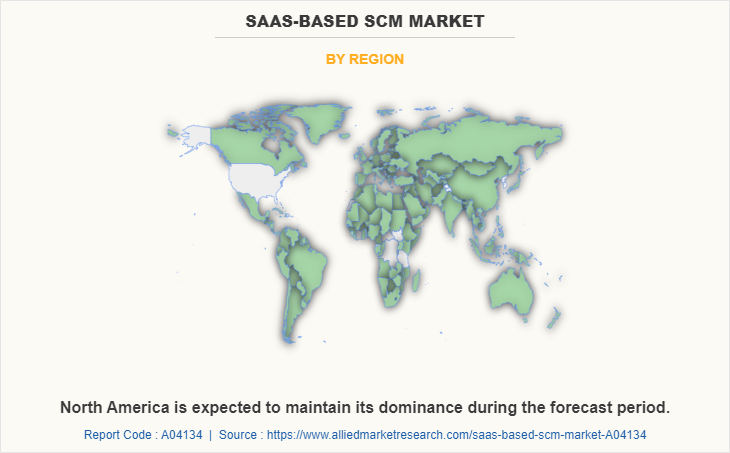SaaS-based SCM Market Statistics, 2030
The global saas-based scm market size was valued at $7.3 billion in 2020, and is projected to reach $26.0 billion by 2030, growing at a CAGR of 13.42% from 2021 to 2030.
The growth of the global SaaS-based SCM market size is driven by growth in demand for real-time supply chain analysis, technology progress in supply chain industry, and increase in ICT spending. In addition, the factors such as development of industrial-grade digital technology and upsurge in need for improved supply chain visibility drives growth of the market. Moreover, surge in need for demand management solutions among enterprises and increase in adoption of SaaS-based SCM software in healthcare and pharmaceutical companies further boosts the growth of the market. However, security concern over cloud deployment among enterprises is expected to impede the market growth. On the contrary, upsurge in demand for transportation management systems (TMS) software is expected to create major opportunities for market expansion in the upcoming years.

SaaS-based SCM provide end-to-end visibility on goods & product mobility through enhanced analytics and supply chain forecasting models. This solution is designed to enhance and strengthen the supply chain operations in an organization by managing production, inventory, sourcing, transportation, and supervising the product demand. In addition, it provides better visibility to organizations with a cross-functional access, and offers exception-based process management platforms, which enable staff to micro-manage steady-state processes.
Segment Review
The SaaS-based SCM market is segmented on the basis of solution, deployment, user type, industry vertical, and region. By solution, the market is bifurcated into software and services. By deployment, the market is divided into public, private, and hybrid. By user type, it is bifurcated into large enterprises and small & medium-sized enterprises (SMEs). Depending on industry vertical, it is classified into consumer goods, retail, food & beverages, healthcare & pharmaceuticals, manufacturing, logistics & transportation, and others. By region, it is analyzed across North America, Europe, Asia-Pacific, and LAMEA.

On the basis of solution, the software segment dominated the global SaaS-based SCM market size in 2020, and is expected to continue this trend during the forecast period. The major factors influencing the SaaS-based SCM software market is high level of cost savings on total cost of ownership and increase in need for real time material monitoring and forecasting of production plan by several industry verticals including consumer goods, retail, manufacturing, and others. However, the services segment is expected to grow at the highest CAGR during the forecast period. In the last few years, the adoption of SaaS based SCM software has notably increased, which has resulted in the adoption of supply chain management services across different industry verticals, as it assures effective functioning of software.

By user type, the large enterprises segment dominated the global SaaS-based SCM market share in 2020, and is expected to continue this trend during the SaaS-based SCM market forecast period, owing to increase in adoption of Supply Chain management software to integrate this software into their existing software and inventories. Furthermore, the small & medium-sized enterprises segment is expected to grow at the highest CAGR during the forecast period, owing to surge in adoption of cloud-based supply chain management software, as it provides cost-effective and efficient solution for SMEs.

North America is expected to maintain its dominance during the forecast period due to rise in spending on transportation & logistics, which is boosting the implementation of automation technologies in logistics and supply chain. The transportation & logistic industry is large & competitive in this region and includes distinct industries such as shipping, railroads, and air services. However, Asia-Pacific is expected to observe highest growth rate during the forecast period. Strong economic growth along with the ongoing development in the services sector, has driven business enterprises to invest heavily in SaaS-based SCM to sustain their growth and improve productivity. In addition, factors such as growth in penetration of mobility, rise in cloud deployment among small & medium businesses, and ongoing modernization of manufacturing & construction industries drive heavy investment in SaaS-based SCM industry in the emerging countries.
The report analyzes the market’s competitive landscape and offers information on several market vendors such as Accenture, SAP SE, Oracle Corporation, Blue Yonder Group, Inc., Infor, Manhattan Associates, The Descartes Systems Group Inc., HighJump (Korber AG), Kinaxis Inc., and IBM Corporation.
Top Impacting Factors
Surge in Demand for Real-Time Supply Chain Monitoring & Management
SaaS-based SCM solutions provide various digital supply chain management needs such as inventory control, production forecasting, information management of goods placed at remote locations, on-time stake holder communication, and others. With cost-effective hybrid deployment model, the adoption of SaaS-based SCM is expected to rise among several industry verticals including retail, food & beverages, manufacturing, automotive, and others.
Furthermore, the SaaS-based SCM enables supply chain manager to monitor exactly where their current operations performing or underperforming, so that they can be prepared for minor problems, and redirect resources for the significant outcomes. In addition, it generates data-driven, reliable solutions, which can be used to make improvements in efficiency of business operations. SaaS-based SCM provides better visibility to organizations with a cross-functional access and offers exception-based process management platforms that enable staff to micro-manage steady-state processes. This fuels the adoption of SCM software among the end users. Moreover, increase in need of improve supply chain visibility and the desire for better transparency of orders and shipment information further boost the growth of the market.
Increase in inclination toward cloud deployment model
The cloud-based deployment model does not involve capital cost, and is low on maintenance requirements; and hence, is most preferred by various enterprises including SMEs and large enterprises. Direct IT control, real-time supply chain tracking, faster data processing, and cost effectiveness of cloud deployment are few factors that are anticipated to elevate the market growth.
Increase in demand for cloud based software in various industries drives the SaaS-based SCM market. The cloud based SCM software offers several benefits over the on-premises supply chain management software’s. Cloud SCM offers pay-per-usage licenses and requires minimal IT setup due to which businesses are adopting it to minimize their operational costs and transform their processes. Also, cloud SCM vendors are working on upgrading their portfolio, which is further expected to reduce the solutions’ costs. For instance, in February 2021 SIEMENS, IBM, and Red Hat launched hybrid cloud initiative to increase real-time value of industrial supply chain management data.
Moreover, factors such as the increase in adoption of cloud SCM among small and medium enterprises (SMEs), rise in need for low initial investment, and development of cloud SCM in e-commerce industry provide lucrative opportunities for the market. Apart from this, it offers several advantages to the organizations such as faster deployment, minimal risk, greater flexibility, less demand on IT, increased visibility, and others, which are positively impacting the SaaS-based SCM market growth.
COVID-19 Impact Analysis
Post COVID-19, the global SaaS-based SCM industry was valued at $7,314.32 million in 2020, and is projected to reach $25,980.18 million by 2030, registering a CAGR of 13.42%. The current estimation of 2030 is projected to be higher than pre-COVID-19 estimates. This is attributed to rapid growth in demand for SCM software due to supply chain disruptions triggered by the COVID-19 pandemic. In addition, there is huge demand for online shopping in several areas, which requires food & beverage, manufacturing, and logistics companies to increase their investments in automation, including the automation of supply chains. Thus, fueling the growth of the market.
Key Benefits for Stakeholders
- This report provides a quantitative analysis of the market segments, current trends, estimations, and dynamics of the saas-based scm market analysis from 2020 to 2030 to identify the prevailing saas-based scm market opportunities.
- The market research is offered along with information related to key drivers, restraints, and opportunities.
- Porter's five forces analysis highlights the potency of buyers and suppliers to enable stakeholders make profit-oriented business decisions and strengthen their supplier-buyer network.
- In-depth analysis of the saas-based scm market segmentation assists to determine the prevailing market opportunities.
- Major countries in each region are mapped according to their revenue contribution to the global market.
- Market player positioning facilitates benchmarking and provides a clear understanding of the present position of the market players.
- The report includes the analysis of the regional as well as global saas-based scm market trends, key players, market segments, application areas, and market growth strategies.
SaaS-based SCM Market Report Highlights
| Aspects | Details |
| By Solution |
|
| By Deployment |
|
| By User Type |
|
| By Industry Vertical |
|
| By Region |
|
| Key Market Players | Accenture, Infor, HighJump, The Descartes Systems Group Inc., SAP SE, IBM, Blue Yonder Group, Inc., Oracle Corporation, Kinaxis Inc., Manhattan Associates, Inc. |
Analyst Review
According to the insights of the CXOs of leading companies, the hybrid deployment in the SaaS-based SCM market has higher potential for growth in the near future. At present, the adoption of hybrid and public deployments are on the rise due to enhanced efficiency and availability of various cloud-based supply chain solutions such as pay as you go model, professional & managed services, and others. Key market players have adopted efficient techniques to develop innovative cloud solutions to cater to various needs such as reduced downtimes and faster management of logistic and supply chain flow.
Rise in need to improve supply chain visibility and the desire for better transparency of inventory, orders, and shipment information drive the growth of the SaaS-based SCM market. Increase in impact of digital commerce is anticipated to drive the investment in supply chain analytics and rise in need for faster decision-making & eliminating inefficiencies boost the investment in smart machines and IoT and the associated supply chain management software, which is expected to provide lucrative opportunities for the market. By 2021, SaaS deployments were expected to increase at a higher rate and sales of on-premises licenses were declined. There is an increase in the demand for hybrid supply chain environments with coexisting cloud and on-premises applications with information hubs and supplier networks dominating the move to cloud. Owing to the major shift toward SaaS delivery model, small- & medium-sized businesses and organizations from the emerging markets are heavily investing in the market, which in turn increases the overall spending and boosts the market growth.
Furthermore, ongoing modernization of supply chain network in number of organizations offer lucrative opportunities for the market. Supply chain operations are under pressure to adopt new business models and technologies to excel in an increasingly complex and volatile world.
Due to which, the leaders in the organization are innovating and investing in new processes and technologies to help their companies remain relevant in their markets. Those companies that are investing and innovating will ensure that they remain competitive in the future. On the other hand, the SaaS-based SCM market is concentrated with major players adopting 50%-60% of the market share. The degree of concentration will remain the same during the forecast period. Strategic partnerships among market participants such as logistics service providers, warehouse service providers, and transportation service providers are providing SaaS-based supply chain management software (SCM) vendors with more opportunities for introducing new products and expanding their market foothold. For instance, in June 2020, Epicor Software Corporation partnered with ETQ to promote business growth. This partnership provides a solution for mid-market enterprises with complete and adaptable end-to-end capabilities
The global SaaS-based SCM market was valued at $7,314.32 million in 2020, and is projected to reach $25,980.18 million by 2030, registering a CAGR of 13.42%.
Consumer goods has witnessed a huge transformation in their supply chain activities with the modifications in technology, social media, and consumer preferences. This industry is seeing major applications of SaaS-based SCM solutions.
North America is expected to maintain its dominance during the forecast period due to rise in spending on transportation & logistics, which is boosting the implementation of automation technologies in logistics and supply chain.
Rise in need to improve supply chain visibility and the desire for better transparency of inventory, orders, and shipment information drive the growth of the SaaS-based SCM market. In addition, increase in impact of digital commerce is anticipated to drive the investment in supply chain analytics and rise in need for faster decision-making & eliminating inefficiencies boost the investment in smart machines and IoT and the associated supply chain management software, which is expected to provide lucrative opportunities for the market.
The top companies holding the market share includes Accenture, SAP SE, Oracle Corporation, Blue Yonder Group, Inc., Infor, Manhattan Associates, The Descartes Systems Group Inc., HighJump (Korber AG), Kinaxis Inc., and IBM Corporation
Loading Table Of Content...



